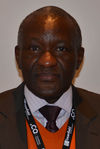Edmund Katiti
 | |
| Country: | Uganda |
| Email: | edmund[at]nepad.org |
| LinkedIn: |
Dr. Edmund Katiti is the Policy and Regulatory Advisor on ICT Infrastructure in the NEPAD e-Africa Commission (The New Partnership for Africa's Development), which he joined in November 2005. He coordinates the development of policy and regulatory frameworks for NEPAD ICT infrastructure programmes and projects. He works across East Africa, and 23 African countries. He is involved in regional and international IT fora, such as ICANN, the ITU, and others.[1] In his role at NEPAD, Edmund Katiti was responsible for developing and implementing the Kigali Protocol, which is a policy and regulatory framework to accelerate development of ICT broadband infrastructure in Africa. The Protocol is guided by policy principles based on non-discriminatory, open access and equitable joint ownership of the backbone infrastructure across the region; the use of Special Purpose Vehicles( SPV’s) to build, own and operate the NEPAD Network, which is considered a ‘’public good’’; and the need to apply the principle of Public Private Partnership to develop the network. The protocol promotes and facilitates the provision of ICT broadband infrastructure on the continent that will support high-quality speed and reliable electronic communication at affordable prices.[2]
Dr. Katiti's previous roles include Deputy Vice Chancellor for Academic Affairs at Kampala International University; founding Director of the Institute of Computer Science, Makerere University, Uganda; President of the Uganda Computer Society; and Chairman of the Uganda National Standards Council.[3]
He studied Electrical and Electronics Engineering at the South Bank Polytechnic in London, UK, after which he pursued a Masters in Telecommunication Systems Engineering and a Ph.D. in the same field at the University of Essex, UK.
